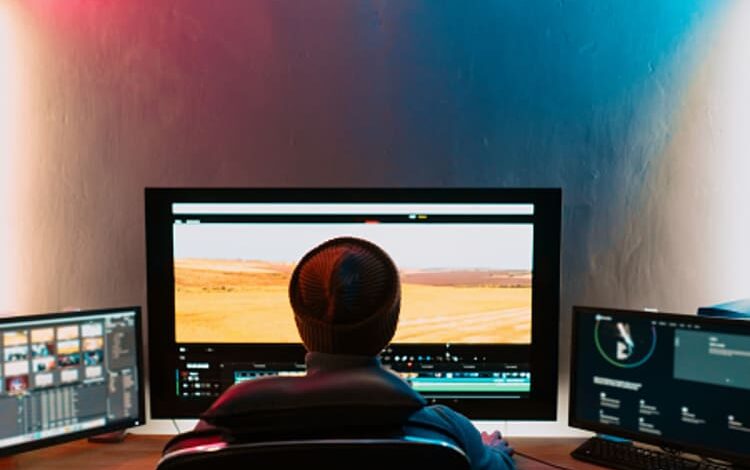What Should I Major in for Digital Editing? A Comprehensive Guide

In today’s digital world, video and digital content creation have become vital communication, marketing, and entertainment elements. A significant part of this growing industry is digital editing, which includes video editing, sound design, motion graphics, and much more. If you’re passionate about digital editing and wondering, “What should I major in for digital editing?” this article will provide a comprehensive overview of relevant majors, the skills you’ll need, and career paths.
Understanding Digital Editing
Digital editing is manipulating audio, video, and graphics to create cohesive content for various platforms. It involves technical expertise in software such as Adobe Premiere Pro, Final Cut Pro, After Effects, and more. With the rise of streaming platforms like YouTube, TikTok, and Vimeo, the demand for skilled digital editors has skyrocketed. A formal education in this field can provide you with the technical knowledge, hands-on experience, and creative skills necessary to succeed.
Why Choose a Major in Digital Editing?
The digital editing industry is vast, encompassing various roles like video editing, sound design, color grading, and motion graphics. Majoring in a relevant field allows you to explore these areas and build a well-rounded portfolio that can lead to multiple career opportunities.
Top Majors for a Career in Digital Editing
- Film and Media Studies
- Majoring in Film and Media Studies provides a broad understanding of cinema, television, and online video. This major focuses on analyzing and creating visual media, allowing students to explore film theory, history, and practical filmmaking. Courses include film editing, screenwriting, and cinematography. You’ll also gain experience with editing software, preparing you for a career in video editing, sound design, or visual effects.
- Relevant Courses:
- Film Editing Techniques
- Sound Design and Audio Editing
- Visual Storytelling and Cinematography
- Career Opportunities:
- Film Editor
- TV Editor
- Post-Production Specialist
- For more details on a film editing career, check out this guide.
- Digital Media Production
- This major focuses on digital content creation, including video production, audio editing, and graphic design. Digital Media Production programs are ideal for students interested in working on online platforms or in advertising. You’ll learn to work with digital cameras, editing software, and multimedia tools.
- Relevant Courses:
- Video Production and Editing
- Digital Sound Editing
- Motion Graphics and Animation
- Career Opportunities:
- Digital Content Creator
- Social Media Video Editor
- Motion Graphics Designer
- A deeper look into digital media production can be found here.
- Graphic Design
- Graphic Design may seem like an unusual major for digital editing, but with the increasing demand for motion graphics and animation, it is a versatile option. Students in graphic design programs develop skills in creating digital images, typography, and layouts, which are crucial for editing visual content.
- Relevant Courses:
- Motion Graphics for Digital Media
- Interactive Media Design
- Animation for Visual Effects
- Career Opportunities:
- Motion Graphics Editor
- Multimedia Specialist
- Visual Effects Designer
- Explore more career paths in graphic design at this resource.
- Animation and Visual Effects
- If you want to work with animation or create special effects for movies, TV shows, or video games, majoring in Animation and Visual Effects is an excellent choice. This major focuses on 2D and 3D animation, visual effects, and computer-generated imagery (CGI).
- Relevant Courses:
- 3D Modeling and Animation
- Special Effects Editing
- Visual Effects Compositing
- Career Opportunities:
- Visual Effects Artist
- 3D Animator
- CGI Editor
- Check out the Animation Career Guide for more information.
- Communications
- Communications majors often focus on media production, public relations, and marketing, all involving digital content creation. While this major is broader, students can specialize in digital media, acquiring skills in editing and producing content for news, advertising, and social media platforms.
- Relevant Courses:
- Media Production and Editing
- News Editing and Video Journalism
- Digital Storytelling
- Career Opportunities:
- News Video Editor
- Social Media Editor
- Marketing Video Producer
- For more on communications majors, check out this link.
Skills Required for a Career in Digital Editing
Regardless of your primary, specific skills are essential for a successful career in digital editing. These include:
- Proficiency in Editing Software: Mastering tools like Adobe Premiere Pro, Final Cut Pro, DaVinci Resolve, and After Effects is crucial.
- Attention to Detail: Editing requires careful attention to small details, whether color correction or sound alignment.
- Creative Thinking: Digital editors often need to find innovative solutions to visual problems, requiring technical expertise and creative thinking.
- Time Management: Tight deadlines are expected in editing, so managing your time effectively is essential.
Semantically Related Words and Their Use in Digital Editing
In SEO and content marketing, using semantically related words is crucial. These words help search engines understand the context of your content. For example, while discussing digital editing, terms such as “video production,” “audio engineering,” “motion graphics,” and “visual effects” can improve your article’s relevance.
Including these semantically related words makes your content more accessible to those searching for information on various aspects of digital editing. It can also make the content more engaging for readers, demonstrating a comprehensive understanding of the field.
Final Thoughts
Choosing the right major for a digital editing career depends on your interests and career goals. Whether you are passionate about film, graphic design, animation, or digital media, there is a major that aligns with your aspirations. Each of the majors mentioned offers different courses, skills, and career opportunities, but all can lead to a successful career in digital editing.
Digital editing is a dynamic and growing field critical in content creation across industries. As demand for high-quality video and audio content continues to rise, digital editors will find themselves at the forefront of innovation in media production.
Questions and Answers
Q1: Can I become a digital editor without a degree?
Yes, it is possible to become a digital editor without a formal degree, but having a degree provides a solid foundation of knowledge and skills. Additionally, employers often prefer candidates with formal education.
Q2: What software should I learn for a career in digital editing?
Some essential software for digital editing includes Adobe Premiere Pro, Final Cut Pro, DaVinci Resolve, and After Effects.
Q3: Is it necessary to have a portfolio when applying for digital editing jobs?
Yes, having a portfolio showcasing your work is crucial when applying for digital editing positions. Employers want to see examples of your editing style and technical abilities.
Q4: How long does it take to become proficient in digital editing?
Proficiency in digital editing depends on the individual, but with dedicated practice, you can become skilled within one to two years.
Category to Publish This Article:
Education, Career Guidance, Technology
4oWhat Should I Major in for Digital Editing? A Comprehensive Guide
In today’s digital world, video and digital content creation have become vital communication, marketing, and entertainment elements. A significant part of this growing industry is digital editing, which includes video editing, sound design, motion graphics, and much more. If you’re passionate about digital editing and wondering, “What should I major in for digital editing?” this article will provide a comprehensive overview of relevant majors, the skills you’ll need, and career paths.
Page Title: What Should I Major in for Digital Editing? A Complete Guide to Choosing the Right Degree
Meta Description: Discover the best majors for digital editing. Learn what degree to choose for a video, audio, or visual editing career. Expert advice inside.
Meta Tags: digital editing, video editing central, best paramount for digital editing, a career in digital editing, how to become a digital editor, degrees for digital editors
Understanding Digital Editing
Digital editing is manipulating audio, video, and graphics to create cohesive content for various platforms. It involves technical expertise in software such as Adobe Premiere Pro, Final Cut Pro, After Effects, and more. With the rise of streaming platforms like YouTube, TikTok, and Vimeo, the demand for skilled digital editors has skyrocketed. A formal education in this field can provide you with the technical knowledge, hands-on experience, and creative skills necessary to succeed.
Why Choose a Major in Digital Editing?
The digital editing industry is vast, encompassing various roles like video editing, sound design, color grading, and motion graphics. Majoring in a relevant field allows you to explore these areas and build a well-rounded portfolio that can lead to multiple career opportunities.
Top Majors for a Career in Digital Editing
- Film and Media Studies
- Majoring in Film and Media Studies provides a broad understanding of cinema, television, and online video. This major focuses on analyzing and creating visual media, allowing students to explore film theory, history, and practical filmmaking. Courses include film editing, screenwriting, and cinematography. You’ll also gain experience with editing software, preparing you for a career in video editing, sound design, or visual effects.
- Relevant Courses:
- Film Editing Techniques
- Sound Design and Audio Editing
- Visual Storytelling and Cinematography
- Career Opportunities:
- Film Editor
- TV Editor
- Post-Production Specialist
- For more details on a film editing career, check out this guide.
- Digital Media Production
- This major focuses on digital content creation, including video production, audio editing, and graphic design. Digital Media Production programs are ideal for students interested in working on online platforms or in advertising. You’ll learn to work with digital cameras, editing software, and multimedia tools.
- Relevant Courses:
- Video Production and Editing
- Digital Sound Editing
- Motion Graphics and Animation
- Career Opportunities:
- Digital Content Creator
- Social Media Video Editor
- Motion Graphics Designer
- A deeper look into digital media production can be found here.
- Graphic Design
- Graphic Design may seem like an unusual major for digital editing, but with the increasing demand for motion graphics and animation, it is a versatile option. Students in graphic design programs develop skills in creating digital images, typography, and layouts, which are crucial for editing visual content.
- Relevant Courses:
- Motion Graphics for Digital Media
- Interactive Media Design
- Animation for Visual Effects
- Career Opportunities:
- Motion Graphics Editor
- Multimedia Specialist
- Visual Effects Designer
- Explore more career paths in graphic design at this resource.
- Animation and Visual Effects
- If you want to work with animation or create special effects for movies, TV shows, or video games, majoring in Animation and Visual Effects is an excellent choice. This major focuses on 2D and 3D animation, visual effects, and computer-generated imagery (CGI).
- Relevant Courses:
- 3D Modeling and Animation
- Special Effects Editing
- Visual Effects Compositing
- Career Opportunities:
- Visual Effects Artist
- 3D Animator
- CGI Editor
- Check out the Animation Career Guide for more information.
- Communications
- Communications majors often focus on media production, public relations, and marketing, all involving digital content creation. While this major is broader, students can specialize in digital media, acquiring skills in editing and producing content for news, advertising, and social media platforms.
- Relevant Courses:
- Media Production and Editing
- News Editing and Video Journalism
- Digital Storytelling
- Career Opportunities:
- News Video Editor
- Social Media Editor
- Marketing Video Producer
- For more on communications majors, check out this link.
Skills Required for a Career in Digital Editing
Regardless of your primary, specific skills are essential for a successful career in digital editing. These include:
- Proficiency in Editing Software: Mastering tools like Adobe Premiere Pro, Final Cut Pro, DaVinci Resolve, and After Effects is crucial.
- Attention to Detail: Editing requires careful attention to small details, whether color correction or sound alignment.
- Creative Thinking: Digital editors often need to find innovative solutions to visual problems, requiring technical expertise and creative thinking.
- Time Management: Tight deadlines are expected in editing, so managing your time effectively is essential.
Semantically Related Words and Their Use in Digital Editing
In SEO and content marketing, using semantically related words is crucial. These words help search engines understand the context of your content. For example, while discussing digital editing, terms such as “video production,” “audio engineering,” “motion graphics,” and “visual effects” can improve your article’s relevance.
Including these semantically related words makes your content more accessible to those searching for information on various aspects of digital editing. It can also make the content more engaging for readers, demonstrating a comprehensive understanding of the field.
Final Thoughts
Choosing the right major for a digital editing career depends on your interests and career goals. Whether you are passionate about film, graphic design, animation, or digital media, there is a major that aligns with your aspirations. Each of the majors mentioned offers different courses, skills, and career opportunities, but all can lead to a successful career in digital editing.
Digital editing is a dynamic and growing field critical in content creation across industries. As demand for high-quality video and audio content continues to rise, digital editors will find themselves at the forefront of innovation in media production.
Questions and Answers
Q1: Can I become a digital editor without a degree?
Yes, it is possible to become a digital editor without a formal degree, but having a degree provides a solid foundation of knowledge and skills. Additionally, employers often prefer candidates with formal education.
Q2: What software should I learn for a career in digital editing?
Some essential software for digital editing includes Adobe Premiere Pro, Final Cut Pro, DaVinci Resolve, and After Effects.
Q3: Is it necessary to have a portfolio when applying for digital editing jobs?
Yes, having a portfolio showcasing your work is crucial when applying for digital editing positions. Employers want to see examples of your editing style and technical abilities.
Q4: How long does it take to become proficient in digital editing?
Proficiency in digital editing depends on the individual, but with dedicated practice, you can become skilled within one to two years.
Category to Publish This Article:
Education, Career Guidance, Technology
4o




